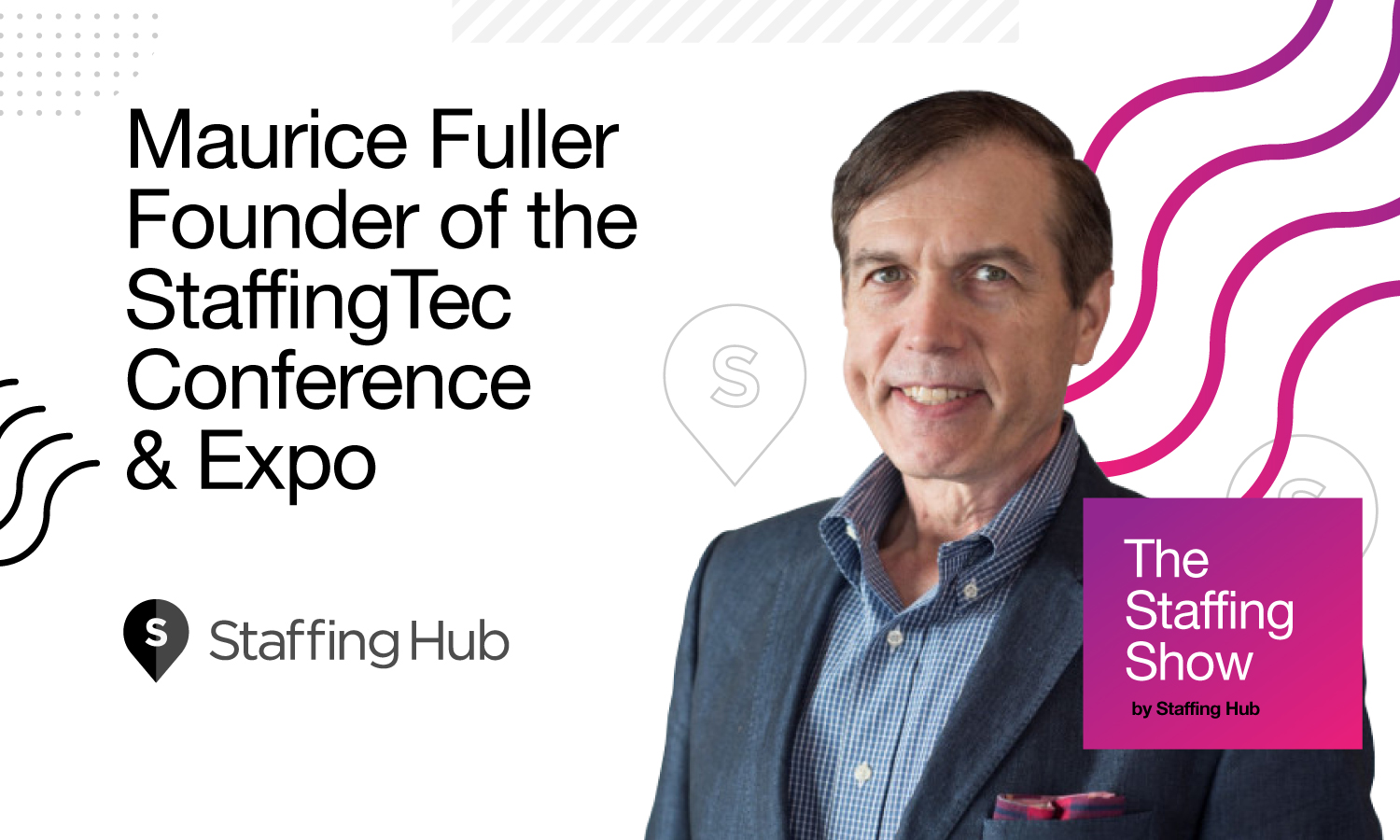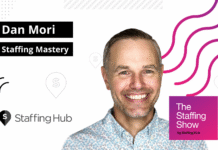
In this episode, Staffing Hub President David Folwell interviewed Maurice Fuller, staffing technology expert and founder of the StaffingTec Conference & Expo at Bullhorn Engage earlier this year.
Fuller brings his years of recruiting experience and his tech knowledge to the table, forecasting that the staffing and recruiting space is going to change as much in the next decade as it did in the past 25 years.
Think about how different the world was in 1993 — maybe you were sending faxes, experiencing your first PDF, or hearing the word SPAM for the first time. Now, imagine that amount of change compressed into the next decade.
Fuller’s here to help give you practical tips on how to make the smart tech choices that will keep your staffing firm ahead of the curve.
Staffing Hub: I’m here with Maurice Fuller of StaffingTec today. Very excited to have you here on the podcast, and to talk to you about what’s next in staffing. We’re here at Bullhorn Engage, and I’m just going to go through a couple questions. Why don’t you start off with a little bit of an introduction on your background and StaffingTec?
Maurice: Sure, dude. Thanks for having me on your podcast. I’m Maurice Fuller, I’m the founder of New Vector Group and the StaffingTec Conference. I’ve been involved in the staffing industry for north of 20 years now. I started as a recruiter a long time ago and gradually worked my way up into leadership positions for a large $150 million IT staffing firm. Then, eventually, I opened my own firm focused on consulting and training. Then, over the last year, I’ve moved into conferences and advisory services around staffing technology. That’s what StaffingTec is all about.
Staffing Hub: Awesome, awesome. Why’d you choose to come to Bullhorn Engage?
Fuller: Bullhorn is an amazing conference, and it continues to get better every year. This is about my fifth Engage, and this Engage is at least twice as large as the Engage I went to five years ago.
Bullhorn has become a very significant player in the staffing technology arena, and with the acquisitions of Sendouts, MaxHire, Talent Rover, and Jobscience, they are really playing a central role now in the applicant tracking system space.
They bring together at this conference a lot of very, very smart people at every level, and with vendors, with the work that they’re doing, it’s a great opportunity to see their vision for how they plan to evolve their products and technologies, and to meet directly with the folks at Bullhorn to learn more about where they’re headed, and deepen those relationships.
It’s an amazing conference. I highly recommend anybody that’s involved in the Bullhorn universe, or any of the other ATS systems that I mentioned before, attend this conference every single year.
Staffing Hub: Absolutely. It’s been a great conference. It’s always nice networking. Are there any key takeaways, things that you’ve learned at the conference? Networking, any things that you think are worth sharing with the audience?
Fuller: Bullhorn certainly has a great vision for how they intend to evolve the product, and they have some very, very smart people. Bullhorn is now a very large company. They’re getting close to 1,000 people. They have a very large development team, and they’re looking now across, really every facet of the applicant tracking system, from the back office, the middle office, the front office. They’re really covering the full gamut, and they have developers assigned in all of these different areas.
We’re focused on the StaffingTec side. We look at a lot of technologies that plug in and connect with the ATS to extend the capabilities of the ATS and the integrations. There’s an awful lot of development that’s occurring in all those different areas.
It’s critical to pick the right ATS. The right ATS is the foundation for innovation.
I think for a lot of staffing firms, as more and more companies land on the Bullhorn platform, one of the questions that come up is:
How do you differentiate yourself? If everybody’s on the same ATS, how do you separate your company from everyone else who’s using the same enabling technology to run their staffing firms?
That’s where I think that there’s a tremendous opportunity to enhance Bullhorn through automations, through the way you configure Bullhorn, the way you use Bullhorn, and the technologies that you plug into Bullhorn.
Two companies might be using the same enabling technology, but they’re using it completely differently. That’s where I think innovation plays a huge role in the success that you’re likely to have as a company.
Staffing Hub: Absolutely. I couldn’t agree more. Maurice brings his background here. Starting with the recruiter, being a CIO, and now leading this new conference, StaffingTec, which I attended recently, and also a fantastic event. If you’re looking to identify what technology to use in your tech stack, it’s one of the conferences that I would highly recommend attending. I think it’s interesting that with your background, especially — I love that you have the recruiter side of it as well — and you kind of mentioned this a little bit already with Bullhorn, but they have the marketplace, and everybody can have the same ATS, but the implementation can be so much different.
What are you seeing in terms of best practices or any recommendations in terms of how you vet vendors from the marketplace, or how you take and kind of manipulate Bullhorn to be a unique or a differentiated product for you?
Fuller: Without getting into a lot of specifics, because so much of it depends on your business and your processes that you’re using, and there are so many ideas, you know? If you think about it, and you bring a group of people together, you can instantly put together dozens and dozens of ideas. When you talk to different technology providers, there are so many great technology providers out there. It’s very easy to become completely overwhelmed with so many different opportunities to improve performance.
What we are trying to do is help staffing firms grow faster and operate more profitably — through technology, but also through improvements in processes. What I encourage everyone to do is to think strategically. Typically, the staffing industry is very, very tactical.
Even when I’ve been part of a very large organization, so much of what we’re doing is focused on this week, or this quarter. It’s rare to find staffing firms that are really thinking beyond a year or even multiple years out.
It’s so critical, I think, to maintain a roadmap that encompasses all the different ideas that you’ve come across for continuous improvement, and then work through the ROI that you’re likely to obtain from the different opportunities.
Some ideas are extremely simple to implement. For example, I was talking to somebody who did nothing more than implement some technology to use texting to remind candidates that their interview is coming up, and to check back with them after the interview to see how the interview went — also through texting. That simple innovation dramatically improved the rates at which candidates showed up for interviews.
Sometimes the simplest little innovations can have a significant impact on performance. I think it’s important to track these dozens and dozens of ideas and opportunities to invest in third-party technologies, and then systematically work through the ROI of all of them and look at the cost involved to invest in those technologies, and the rate of return that you’re likely to get, and then sort for high ROI investment opportunities, and concentrate on the ones that are likely to yield the highest results in terms of payback, and also the ones that are going to help you mitigate operational risk as well.
Strive for that right combination of revenue growth, profitability growth, gross margin improvement, and a risk reduction.
Just stay highly focused on the highest ROI opportunities, but always dabble. Look for opportunities constantly. Look for opportunities to innovate and improve. That’s what it’s going to take to win in staffing.
We’re becoming increasingly technology driven. If you look at past technology and accountability, so much of what we’ve done in the past has been people. All about every problem can be fixed by putting more people on it. That’s no longer the case. Increasingly, this industry is about technology that are driving our operations.
The companies that are going to succeed in the future are going to be highly technology driven, and they’re going to be highly innovative.
Staffing Hub: Absolutely. With your background, and one of the things that I’ve heard from a lot of the attendees here is there are so many options, there are hundreds of technology suppliers to the staffing industry. You’re talking about focusing on ROI and [inaudible 00:09:17], but do you have any standard processes that you used as a CIO or that you would recommend now that, in terms of a way to kind of make that decision making more strategic, or anything that you can maybe operationalize on an annual basis, in terms of, “Here’s how many vendors you should look at. Here’s a way to actually measure the ROI for each product”?
Fuller: I mean, there’s some technologies that are just an absolute no brainer. For example, let’s say texting. You know, texting is huge and you’ll get immediate payback from that. In fact, speaking of texting, there are scenarios right now where you could just cut out traditional phone conversations entirely, and just do everything through different type of texting communications. When it first became available, it was a high ROI kind of investment. Now, in just a few short years, it’s mandatory. If you’re not texting, you’re not keeping up.
In that case, it’s just like, you must have. Before, it was like a higher ROI opportunity, now you have to have it if you want to succeed. My view is you’ve got to be constantly looking at everything that’s out there. These technology suppliers are your friends. They’re there to help you succeed with your business. Talk to the technology suppliers, understand what they’re doing. It’s not easy to calculate ROI. I mean, I sit down, and I think about, “What is it going to cost to implement the technology? What does it cost on a recruiting basis to have the technology in place?” Then I literally think through, “What does this technology do for me? Is it going to help me gain more revenue, make more placements? Is it going to help reduce operational cost? Is it going to improve gross margins? You know, where on the PNL does this technology help us improve our EBITDA.
Then, I’ll calculate out over some financial period, what kind of return we can expect, what the cost is, and I’ll literally do a net present value analysis, earned payback analysis, ROI analysis in my spreadsheet. Then, I will sort that top to bottom, and I’ll sort it a couple of different ways. I’ll look at ROI, but also look at how many dollars are involved to make those investments, and what the timeline is to make those investments.
I don’t know of any other way to do it. Especially when you’re dealing with dozens and dozens of ideas. Obviously, some things are simple to do. If it’s just making a simple configuration change, that doesn’t cost hardly anything, we’ll do those things right away. If it’s a bigger project, depending on how many people are involved, we want to sort of phase those in depending on how much payback that we’re likely to get.
Staffing Hub: Absolutely. One of the things you and I were talking about earlier this week, was about the tech stack. I think you have a very, I would say, strategic way of looking at that, and I think more so than what I’ve seen from most of staffing. I think it might be interesting just to hear your thoughts on kind of the higher level of how you’re looking at the tech stack.
Fuller: Right, so we’ve built an infographic that’s available on StaffingTec.com, that you can download. We’ve identified over 40 categories of software that connect with the ATS. Within each of these categories we have, in some cases, a handful of suppliers, in some cases literally hundreds of suppliers that have technologies that work within that space.
David, you’re right. What I see sometimes with staffing firms is they’ll latch onto, you know, a particular solution that they may have heard about, but there’s actually multiple players within that category.
I think it’s important to identify a particular category, and then look at the different players that are in there, and identify the differences, the strengths and weaknesses of the different products.
Then, look at making a commitment to that category as an addition to your technology stack, and then identify the solution that’s going to work best for you.
Again, everything built around ROI, and also looking strategically as well. Another aspect of strategy is also how you intend to evolve your company, meaning do you see yourself moving into specific segments? If you’re moving into specific segments, you have specific technology requirements that have to be in place in order to succeed.
Or, for example, do you intend to move into more online staffing? Well, if you intend to do that, there’s technology you need to support that. If your aim is to take on more VMS related business, you have to absolutely be prepared technologically to have the right technologies in place to succeed in that arena.
I think it’s nearly impossible to sort of generically go into a particular segment of the industry and expect to succeed without some industry-specific technology that’s going to support you in those areas.
Staffing Hub: Absolutely, absolutely. Then, as the staffing industry’s changing, which I think all business is moving faster than ever before, what are some of the things that you can see as disruptions to the industry? Are there any major trends that you see over the next three to five years that you see as kind of shaking things up in a major way?
Fuller: Sure. Right now there’s a lot of talk about AI, and that was certainly a big focus of what we were doing at our last StaffingTec conference. Lots of conversation about how that’s going to change the industry. There’s no question that AI will have a big impact in the years ahead.
One of the things that I found really interesting at this conference is talking to some developers, is how quickly they were able to use commercially available AI technologies to implement very powerful solutions. You know, being able to prototype solutions within just a matter of days that had a significant impact on productivity.
Now, it takes more time to productize some of these prototypes, and to bring them to market, but the AI and machine learning that’s now available on Microsoft Azure, on Amazon Web Services, IBM’s technologies, et cetera, very, very powerful. Making those available to developers is going to change everything.
Right now, staffing is extremely administratively intensive, and there are a lot of activities that we do that are basically, essentially, almost like minimum wage work. If we’re in sales or recruiting, we’re bouncing around constantly between high-value work and low-value work.
As we can use AI to take on more of the low value work, then the participants that are working within the staffing firms are going to be working at higher and higher levels. The type of people that we are going to need within our staffing firms, as our staffing technology becomes more and more sophisticated is going to change. I think the percentage of spend on technology is going to increase and the percentage of spend on people might decrease.
Getting back to development, so AI is going to play a big role. We’re just at the very, very early stages of that, and it’s all going to be enabled through these major platforms like Azure and AWS.
The next thing beyond that is going to be blockchain.
Blockchain is truly a disruptive force within staffing. There are a number of players that are working on some really interesting initiatives that could fundamentally change how staffing operates, and it could happen fairly quickly.
Right now, we’re seeing, there’s nothing really on the product side right now, over on blockchain, but there are a lot of people that are actively doing blockchain development, and that’s definitely going to be disruptive.
I think if you’re looking for what’s going to have the most impact on our industry in the next three to five years, and it will truly be game-changing, it’s going to be the combination of AI and blockchain.
The other thing that’s interesting is that as these technologies come into play, the differentiator is really going to be around the candidate experience.
It’s critical that, as staffing firms, we pay a lot of attention to that candidate experience, and what’s it like, what does it feel like to be a candidate, or even an employee of your firm? I think the level of service and support that candidates and employees are going to expect from us is going to raise dramatically in the years ahead, as the game changes.
Staffing Hub: Absolutely. I mean, we talked a lot about AI. I think we all know that it has the potential to completely revolutionize the industry. Do you have any specific examples, use cases, things that somebody could use today, or are there any things you think that are out there that could be implemented quickly?
Fuller: Sure. I was talking to someone a while back, and very interested in AI for staffing. He was asking me like, “How do I buy some of this AI?” I said, “You can’t really buy the AI. It’s all embedded within different pieces of the technology stack.”
Really, AI’s going to wind up everywhere. It’s going to wind up within your ATS. Every piece of technology that bolts into your ATS is going to have some piece of AI associated with it, whether it’s a company doing texting or whether the company’s helping you with sourcing, or video interviewing, there will be more, and more, and more AI that’s associated with that.
You will never see the AI. It will just be there. It will be like magic underneath the hood. You’ll have AI that’s making everything smarter and smarter.
At the same time, something that we’re just on the cusp of seeing is that the candidates themselves are going to be utilizing AI agents to support their job search process. Increasingly, we’re going to have AI both on our side to find the candidates, but the candidates are going to have AI to support them as well.
So what I like to say is that over the next 10 years we’re gonna see as much technological change as we saw over the previous 25 years. And when you rewind the clock and go back to where we were 25 years ago, there was no internet. We were doing everything by phone, by fax, yellow pages, newspaper ads. It was a very primitive time compared to where we are today.
But we’re gonna see that amount of change in the next 10 years. And I think that it’s hard to fathom that amount of change compressed into just one decade. But that’s what we need to be prepared for.
The staffing firms will succeed will be highly technologically savvy and the ones that are not keeping up are gonna really struggle.
Staffing Hub: Absolutely. I couldn’t agree more. And that kind of leads me into the next question. So one of those things that the fastest growing firms, firms that you see that are really successful right now that they’re doing differently. It sounds like paying attention to the technology change is a key part of that. Are there other specific tactics that you see staffing firms implementing? Any things around that that you’d recommend?
The ones that are doing the best in my view are firms that have either assigned senior members of the team that are committed to innovation. Their job is to look at everything that’s out there and continuously evaluate innovation and look for opportunities to bring that innovation in.
And the challenge is that some of these things that are really innovative are not quite ready for primetime. They’re fantastic technologies but they may not be ready to really be put into production. So it’s identifying what’s out there, working with some of these vendors to help shape what they’re doing, and the right time bring them into your technology stack. This is at the leading edge of what’s going on.
So usually having somebody assigned to innovation or in some cases you’ve got the head of the company that’s super into technology and they’re keeping up with everything that’s going on and they’re driving innovation within their own company. But there’s somebody there who’s been assigned the task to identify opportunities for innovation and they’re driving that innovation within the firm.
But increasingly, you can’t just look at it as one person. We like to look at it as multiple stacks. You have a sales stack, a marketing stack, a sourcing stack, a recruiting stack, performance management stack, back office stack. It’s a stack of technologies. If you’re in finance, you have a stack of technologies. If you’re in sales, you have a stack of technologies.
So the person who’s responsible for innovation, they can’t necessarily keep track of every stack that’s out there.
Every leader has to own that stack of technologies and has to own the innovation in their particular stack and continuously make their area more and more productive.
Staffing Hub: Absolutely. And so with that, are there any training, books, anything that you recommend? How do people stay ahead of this and make sure that they are knowledgeable about the technology that’s within their stack or within their responsibility?
Fuller: I think that’s a great question. And I think it’s about encouraging innovation. From the very top. I think if you’re running a staffing firm, then you want to encourage everybody from the ones that are running the back office to marketing to sales to really stay up with all the current trends are. And you yourself as a leader. You have to be aware of some of these trends so you can be able to speak to the trends and encourage people within the organization to pursue these trends.
And different people within your organization are gonna have different layers, levels of comfort with these different technologies and adopting them.
You should really plan on increasingly sophisticated technology stacks to support the different areas of your business. Your staffing firm increasingly is transforming into a technology firm.
If you want to be around long term, think about your company as a technology firm that happens to be in the staffing business rather than a staffing firm that uses technology to do its work.
Staffing Hub: I just agree with that so much. I think that one of the big changes that we’re seeing is the shift from smile and dial and 100 calls a day to how am I actually gonna reach this candidate and the different communication channels are sometimes 10 times more effective than maybe leaving a voicemail. So there’s a huge shift there.
Fuller: On that point, I talk to staffing firms all the time that are not growing as fast as they’d like to or are struggling. And then I’ll ask them, are you using this technology, are you using this technology, are you doing this or that? And then variably, they might be doing one out of 10 things that I recommend. And so it’s super important.
If you’re struggling, there’s a good chance that there’s a technological reason.
And the solution in not doing things the way they were done 10 years ago or even five years ago.
These enabling technologies, especially on the sales side, marketing side, the recruiting side are making people so efficient that these companies that are succeeding, it’s not hard for them. They’re not struggling. Their sales people are backed by powerful technologies that are helping them succeed.
So that’s probably the first place to turn is rather than trying to solve everything manually and changing people out, look for technology that can make people more effective.
Staffing Hub: I completely agree. And with that, you mentioned that you have to have 10 recommendations. I’m sure it’s more. It depends on the company. It can be industry specific. Are there a couple products technologies that you would say things that you got excited about at this conference or things that you would recommend overall?
I mentioned texting. More and more ATS systems have built in texting. But there’s a tremendous amount of value to adding a third-party texting solution into your stack.
There are a tremendous number of technologies to help recruiters source better candidates faster. Video interviewing technology can make a difference.
There is marketing technology now that will enable staffing firms to engage more effectively with hiring managers but also with candidates. So you have thousands and thousands of candidates within your own database that you probably haven’t been in touch with for a while. And you can reactivate those candidates through great marketing technology. Or technology to drive referrals of candidates.
In my experience, referrals are the number one source of candidates. It’s also one of your lowest cost sources of candidates. So if you have technology that can drive referrals, that’s a really good thing. If you have technology that can help support field employees and make them happy, that will increase retention. It will drive more referrals. And it will drive improved business.
Companies that have higher net promoter scores with their clients and with field employees are growing faster. So technology to support field employees and that overall experience is a good thing.
So I would say that those are some of the areas where you can get the most bang for your buck is in the marketing technology and technology to engage with candidates and to find candidates faster.
But again, it depends on the specific segment that you’re operating in.
Staffing Hub: And so switching gears just a little bit, you’ve had the first Staffing Tec this year. The inaugural Staffing Tec. A phenomenal conference. I heard lots of positive feedback from people in the industry. So what’s next?
Fuller: So we’re looking at Staffing Tec 2019 and we want to build on the things that were successful. We’re always gonna be focused on the technology side of staffing and going deep into those areas and educating on trends. And so we’re really looking forward to putting that next wave of Staffing Tec together. And then we also have a number of initiatives that we’ll be rolling out over the next few months around webinars and bringing content, educational content on staffing technology trends to staffing from leaders to keep everyone at the forefront of where the industry is moving. Again, everything is about helping staffing firms grow faster and operate more profitably. And doing that through technology.
Staffing Hub: Thank you so much for being here. This has just been a fantastic conversation. And I completely agree with everything that you’ve said around the Staffing Tec as well. I was in attendance at the conference. I think as we’ve talked today about the importance of making sure you have the right tech stack in place, the right technology strategy, I think, Maurice, you’ve created a conference that’s a great place to kind of go vet all of the vendors and also an educational place where if you’re a CIO, if you’re in the technology side, leader of a staffing firm, it’s a fantastic way to make sure you’re staying ahead of the game.
So I just want to say thank you again for being here today. I really appreciate your time. And it was a great conversation.
Fuller: David, thank you so much for having me.
Staffing Hub: Thanks.
Looking for more podcast interviews? Check out all our episodes here.







